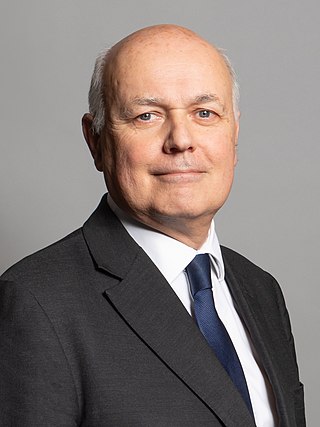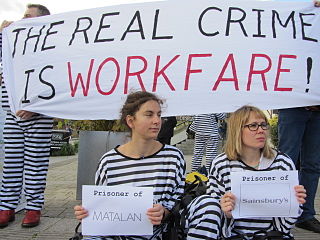Related Research Articles

Sir George Iain Duncan Smith, often referred to by his initials IDS, is a British politician who served as Leader of the Conservative Party and Leader of the Opposition from 2001 to 2003. He was Secretary of State for Work and Pensions from 2010 to 2016. He has been Member of Parliament (MP) for Chingford and Woodford Green, formerly Chingford, since 1992.

Metro is the United Kingdom's highest-circulation freesheet tabloid newspaper. It is published in tabloid format by DMG Media. The newspaper is distributed from Monday to Friday mornings on public places in areas of England, Wales and Scotland. Copies are also handed out to pedestrians.

The Department for Work and Pensions (DWP) is a ministerial department of the Government of the United Kingdom. It is responsible for welfare, pensions and child maintenance policy. As the UK's biggest public service department it administers the State Pension and a range of working age, disability and ill health benefits to around 20 million claimants and customers. It is the second largest governmental department in terms of employees, and the largest in terms of expenditure (£187bn).
Jobseeker's Allowance (JSA) is an unemployment benefit paid by the Government of the United Kingdom to people who are unemployed and actively seeking work. It is part of the social security benefits system and is intended to cover living expenses while the claimant is out of work.

Atos is a French multinational information technology (IT) service and consulting company with headquarters in Bezons, France, and offices worldwide. It specialises in hi-tech transactional services, unified communications, cloud, big data and cybersecurity services. Atos operates worldwide under the brands Atos, Atos|Syntel, Atos Consulting, Atos Healthcare, Atos Worldgrid, Groupe Bull, Canopy, Maven Wave, and Unify.

Mark James Harper is a British politician who has served as Secretary of State for Transport since 2022. A member of the Conservative Party, he has been Member of Parliament (MP) for Forest of Dean in Gloucestershire since 2005.

Thérèse Virginia Rein is an Australian entrepreneur who is the founder of Ingeus, an international employment and business psychology services company.
Employment and Support Allowance (ESA) is a United Kingdom welfare payment for adults younger than the State Pension age who are having difficulty finding work because of their long-term medical condition or a disability. It is a basic income-replacement benefit paid in lieu of wages. It is currently being phased out and replaced with Universal Credit for claimants on low incomes, although the contribution-based element remains available.

A4e was a for-profit, welfare-to-work company based in the United Kingdom. The company began in Sheffield in 1991 with the objective to provide redundant steelworkers with the training required to obtain new jobs.

Guy Thomas Opperman is a British politician serving as Parliamentary Under-Secretary of State for Roads and Local Transport since November 2023. He previously served as Parliamentary Under-Secretary of State for Pensions and Financial Inclusion at the Department for Work and Pensions between 2017 and 2022 and Minister of State for Employment from 2022 to 2023. A member of the Conservative Party, he was first elected at the 2010 general election as Member of Parliament (MP) for Hexham.
Universal Credit is a United Kingdom social security payment. It is means-tested and is replacing and combining six benefits, for working-age households with a low income: income-related Employment and Support Allowance, income-based Jobseeker's Allowance, and Income Support; Child Tax Credit and Working Tax Credit; and Housing Benefit. An award of UC is made up of different elements, which become payable to the claimant if relevant criteria apply: a standard allowance for singles or couples, child elements and disabled child elements for children in the household, housing cost element, childcare costs element, as well as elements for being a carer or having an illness or disability and therefore having limited capability to work.
The Office for Nuclear Regulation (ONR) is the regulator for the nuclear industry in the United Kingdom. It is an independent statutory corporation whose costs are met by charging fees to the nuclear industry. The ONR reports to the Department for Work and Pensions, although it also worked closely with the now-defunct Department of Energy and Climate Change.
Mandatory Work Activity (MWA) was a workfare programme in the United Kingdom whereby individuals had to work for their benefits or risk being "sanctioned" and losing them. MWA started in May 2011, but in November 2015 the DWP confirmed it was "not renewing" it. An academic analysis by the Department for Work and Pensions cast doubt on the effectiveness of MWA, and despite finding "little evidence" that workfare improved claimants gaining paid employment, the DWP ignored the findings of the study, and in June 2012, the scheme received a £5m expansion. A similar but little-known scheme "Jobseeker Mandatory Activity" (JMA) was piloted by New Labour in 2006, but did not last beyond 2008. JMA targeted those claimants 25 and over, who had been unemployed for 6 months or more and made claimants liable to "sanction" for non-compliance.

Workfare in the United Kingdom is a system of welfare regulations put into effect by UK governments at various times. Individuals subject to workfare must undertake work in return for their welfare benefit payments or risk losing them. Workfare policies are politically controversial. Supporters claim that such policies help people move off welfare and into employment whereas critics argue that they are analogous to slavery or indentured servitude and counterproductive in decreasing unemployment.
The Work Programme (WP) was a UK government welfare-to-work programme introduced in Great Britain in June 2011. It was the flagship welfare-to-work scheme of the 2010–2015 UK coalition government. Under the Work Programme the task of getting the long-term unemployed into work was outsourced to a range of public sector, private sector and third sector organisations. The scheme replaced a range of schemes which existed under previous New Labour governments including Employment Zones, New Deal, Flexible New Deal and the now abolished Future Jobs Fund scheme which aimed to tackle youth unemployment. Despite being the flagship welfare-to-work scheme of the Conservative-led coalition government, and then the incumbent Conservative government from May 2015, the DWP announced, in November 2015, that it was replacing the Work Programme and Work Choice with a new Work and Health Programme for the longer-term unemployed and those with health conditions. The DWP also announced that it would not be renewing Mandatory Work Activity and Help to Work which included Community Work Placements.
Universal Jobmatch was a British website for finding job vacancies. The site was developed in a collaboration between the Department for Work and Pensions and Monster.
The Work Capability Assessment (WCA) is used by the British Government's Department for Work and Pensions (DWP) to decide whether and to what extent welfare benefit claimants are capable of doing work or work-related activities. The outcome of the assessment also determines whether claimants are entitled to "new style" Employment and Support Allowance (ESA) and potentially additional elements of Universal Credit (UC).
Help to Work was a government workfare scheme in the United Kingdom for individuals who had not found work after two years on the Work Programme. Help to Work was the overall name for Community Work Placements and other intensified "activation" measures, and was launched at the start of 2014, but it was announced in November 2015, that the DWP was "not renewing" it. Referrals to Community Work Placements ended in March 2016, with contracts ending by October. All other referrals ended in March 2017.
Criticism of the Work Capability Assessment, used by the Department for Work and Pensions in the United Kingdom, to assess and reassess claimants of Employment and Support Allowance or enhanced rate Universal Credit, has been wide-ranging, from the procedure itself, to the financial cost of using both Atos and Maximus to assess claimants. Other criticisms discuss the level of deaths, suicides and high overturn rates at tribunals that the WCA has caused.

Iain Duncan Smith served as Secretary of State for Work and Pensions from 2010 to 2016. A member and previous leader of the Conservative Party, Duncan Smith was appointed to the cabinet by Prime Minister David Cameron following the 2010 general election and the formation of the coalition government between the Conservatives and the Liberal Democrats. He was reappointed after the Conservatives won a majority in the 2015 general election but resigned in March 2016 in opposition to disability benefit cuts.
References
- ↑ "Community Work Placements - ESF". Dwp.gov.uk. Archived from the original on 22 December 2013. Retrieved 19 May 2014.
- ↑ "Department for Work and Pensions' settlement at the Spending Review". DWP. 25 December 2015.
- ↑ Shiv Malik (3 November 2014). "DWP orders man to work without pay for company that let him go". The Guardian.
- ↑ Kevin Curley (20 May 2014). "Kevin Curley: Community work placements are offensive - not to mention unworkable". Third Sector.